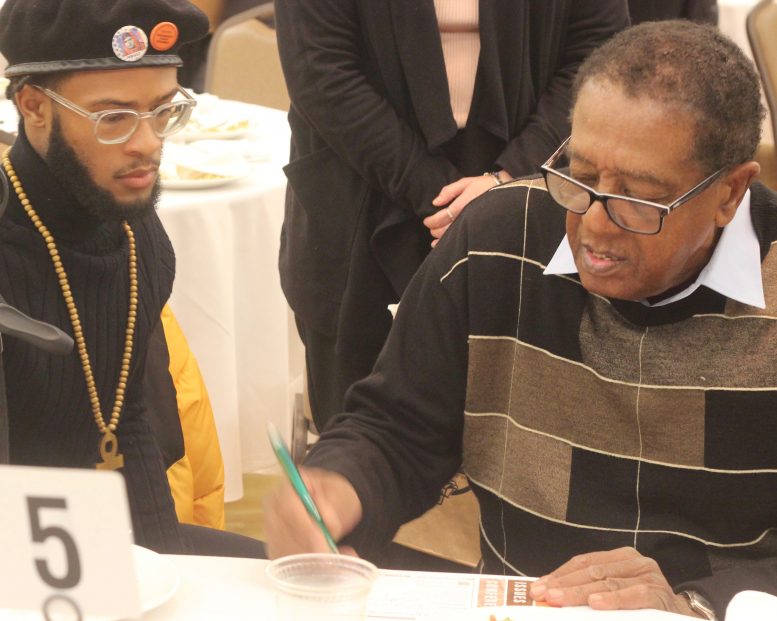By DAVID DUPONT
BG Independent News
When history comes to call sometimes it’s best to just sit back and listen.
History in the person of Bobby Seale, one of the founders of the Black Panther Party and one of the Chicago Eight, came to BGSU Feb. 27 as the keynote speaker for the Black Issues Conference.
And talk he did. His sprawling address spanned well over an hour. It was more like a night time discourse by an elder delivered on the front porch than a formal address delivered from a podium.
Anyone hoping for a polished, well-honed speech may have found Peale’s presentation wanting. Anyone willing to just sit back and follow the 83-year-old through his biographical labyrinth would hear stories that brought alive the history Seale has experienced.
The threads, as tangled as they seemed, had a way of connecting. At one point Seale started talking about hunting. He was proud when he was 13 and his father bought him a .30-30 Winchester rifle for hunting. Despite warnings from his elders about not shooting a bear because an injured bear would attack, Seale did just that. He had to hightail it to safety.
When the Black Panther party formed a couple decades later, Huey Newton suggested they use that rifle. Seale refused. He said the party should buy its own firearms.
He was the one who trained the Panthers in how to use weapons. During his three year stint in the Air Force he was an expert marksman, he said. A credit to his hunting experience.
Even more serious events were tinged with humor. When the Panthers entered the floor of the California state legislature carrying weapons, they had just taken the wrong door, he claimed.
Seale started his speech by mentioning his current project to help teach young people in blighted urban areas the skills they need to build homes. “We’re going to get rid of all this homelessness stuff,” he said. That people are homeless in such a wealthy society is “absurd.”
He comes from a long line of master carpenters and craftsmen. That included his aunt, a seamstress who made dresses for Dinah Washington.
He enlisted in the Air Force but was discharged after an altercation with a superior, a fact noted with approval by Kyle Thompson, vice president of the Black Student Union. Ana Brown, director of the office of multicultural affairs, credited Thompson with suggesting Seale be brought to campus for the Black Issues Conference.
Thompson introduced Seale, a founder of the Black Panther Party, as someone who has made 60 years of contributions to “this nation and the black community.”
Seale took his skills from the Air Force to work in the aerospace industry, including on the Gemini Space Program. He loved that job, he said.
He pursued his engineering studies at Merritt Community College in Oakland. It was there he began his investigations in African-American history and culture. This captivated him as much as engineering, and led to a growing radicalism and the founding of the Panthers.
The Panthers, he said, were intended to mobilize blacks politically. The idea was to elect local officials, including sheriffs, who would respond to their grievances.
The practice of “patrolling the police,” he said, was “to capture the imaginations” of people. “My whole point was building a political machine.”
He had Huey Newton, who was studying law, research all the laws pertaining to carrying firearms and interacting with law enforcement so they would know their limits.
Seale insisted they be uniformed and well groomed, so people knew they weren’t ordinary thugs.
The tactic worked. After one incident, more than 40 people showed up at an informational meeting.
But this was just part of what the Black Panthers did, Seale said. They started clinics to help screen people for sickle cell anemia, a condition that disproportionately strikes people of African descent.
They distributed groceries, including 10,000 bags at one event.
And the party started a free breakfast program. When that program was disrupted after it was decried by Richard Nixon as part of his administration’s crackdown on the Panthers, California legislator Willie Brown passed legislation to offer free breakfast in public schools. Now, Seale said, 28 states have such programs. He counts that as a major success of the Black Panthers.
The crackdown by the FBI destroyed the party. Huey Newton ended up in prison. Seale was imprisoned for a time, and harassed when he wasn’t. Eldridge Cleaver went into exile.
Others died in shoot outs with the police and internal struggles.
“All this was set up by counter-intelligence effort put together by the FBI,” he said.
Getting African-Americans elected to office has taken longer, Seale said, though more progress has been made in recent years.
The stakes are even higher today with the threat of global warming.”Our very existence is at stake.”
Seale said people need to not just register to vote, but get the vote out. That’s the work that needs to be done now.


